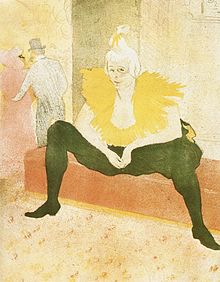Cha-U-Kao
Cha-U-Kao | |
|---|---|
 The Seated Clowness by Henri de Toulouse-Lautrec | |
| Nationality | French |
| Other names | The Clowness |
| Occupation(s) | dancer, acrobat, clown |
Cha-U-Kao was a French entertainer who performed at the Moulin Rouge and the Nouveau Cirque in the 1890s. Her stage name was also the name of a boisterous popular dance, similar to the can-can, which came from the French words "chahut", meaning "noise" and "chaos".[1][2] She was depicted in a series of paintings by Henri de Toulouse-Lautrec. Cha-U-Kao soon became one of his favorite models. The artist was fascinated by this woman who dared to choose the classic male profession of clowning and was not afraid to openly declare that she was a lesbian.
Little is known about her life, including her real name, though she was a gymnast before she worked as a Parisian female clown or "clownesse." During her time as a gymnast, Maurice Guilbert photographed her, capturing her younger self that contrasted with Toulouse-Lautrec's later depictions.[3][4] Her clown performances included a "distinctive black-and-yellow costume with her hair piled up on her head[.]"[5]
Toulouse-Lautrec sometimes sketched Cha-u-Kao with her partner, and these sketches would be included in his portfolio "Elles."[6] It is believed that her partner was Gabrielle the Dancer, another performer and model for Toulouse-Lautrec.[7] In 1979, art historian Naomi Maurer identified Cha-U-Kao in the artist's work as part of an exhibit at the Art Institute of Chicago. (The exhibit ran in the fall of that year.)[8][9]
References
- ^ Lisa Mintz Messinger, Magdalena Dabrowski, Stieglitz and His Artists: Matisse to O'Keeffe : the Alfred Stieglitz Collection in the Metropolitan Museum of Art, Metropolitan Museum of Art (New York, N.Y.), Metropolitan Museum of Art, 2011
- ^ "Henri de Toulouse-Lautrec: The Seated Clowness (Mademoiselle Cha-u-Kao) (49.55.50) | Heilbrunn Timeline of Art History | The Metropolitan Museum of Art". metmuseum.org. Retrieved 2014-06-12.
- ^ "Masterpieces from Paris - | Henri de TOULOUSE-LAUTREC | The clown Cha-U-Kao [La clownesse Cha-U-Kao]". nga.gov.au. Retrieved 2019-05-22.
- ^ "Museum of Human Sexuality". www.facebook.com. Retrieved 2019-05-22.
- ^ Sotheby's (2015-10-30), Henri de Toulouse-Lautrec, 'La Clownesse Cha-U-Kao,' 1895, retrieved 2019-05-22
- ^ "The mystery of the dancer Cha-U-Kao". Lesbian News. 2017-12-23. Retrieved 2019-05-21.
- ^ "Henri de Toulouse-Lautrec. Woman in Bed, Profile, Awakening (Femme au lit, profil, Au petit lever) from Elles. 1896 | MoMA". The Museum of Modern Art. Retrieved 2019-05-22.
- ^ Kuda, Marie J. (July 4, 2001). "GUEST CORNER". Windy City Times. Retrieved 2019-05-22.
{{cite web}}: Cite has empty unknown parameter:|dead-url=(help) - ^ "Paintings by Toulouse-Lautrec". The Art Institute of Chicago. Retrieved 2019-05-22.
Further reading
- Stuckey, Charles F., Henri de Toulouse-Lautrec, and Naomi E. Maurer. Toulouse-Lautrec: Paintings. Art Institute of Chicago, 1979.
- Picture of Cha-U-Kao when she was a gymnast (fig. 3)
